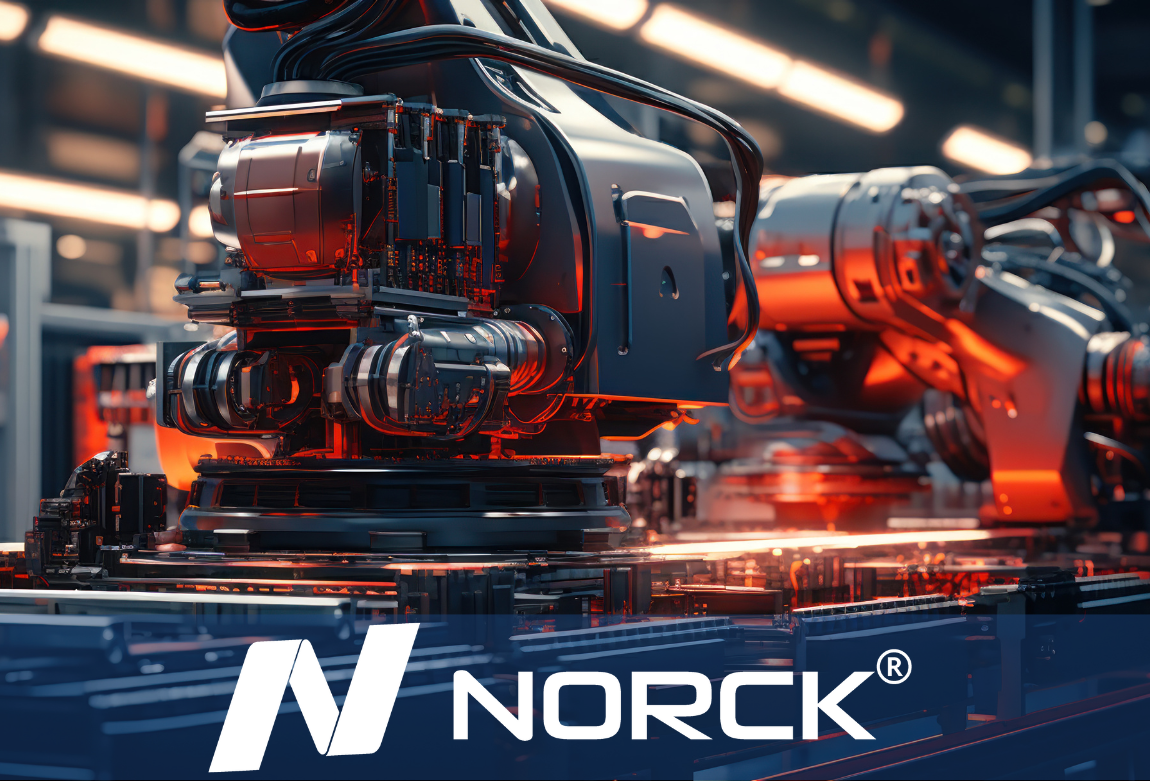AI in Manufacturing and Norck’s Commitment to AI in Manufacturing
Artificial Intelligence (AI) has revolutionized the manufacturing industry, paving the way for increased efficiency, productivity, and innovation. AI's impact on manufacturing processes must be considered. As technology continues to advance at a rapid pace, businesses are embracing AI to stay competitive in today's fast-paced market.
AI technologies are empowering manufacturers to enhance efficiency, optimize processes, and achieve unprecedented levels of precision and productivity. One company at the forefront of this revolution is Norck, a visionary organization committed to harnessing the full potential of AI in manufacturing.
Let's explore how AI is reshaping the manufacturing landscape and discover Norck's unwavering commitment to embracing this cutting-edge technology.
The Impact of AI on Manufacturing Industry
AI has a revolutionary effect on the manufacturing sector. It has improved the efficiency and cost-effectiveness of conventional industrial methods. Manufacturers may enhance production efficiency, lower downtime, and increase product quality by integrating AI technologies.
AI makes predictive maintenance possible, enabling businesses to see potential equipment problems before they arise. By being proactive, this method reduces production line interruptions and boosts overall output.
Additionally, AI-powered analytics offer insightful knowledge about market trends and consumer behavior, empowering manufacturers to make data-driven choices that propel corporate expansion.
Tasks that were formerly labor-intensive and manual are now precisely and accurately automated in production thanks to artificial intelligence. It greatly lowers human error while also saving time. Consequently, businesses are able to fulfill client requests more quickly while upholding strict quality control requirements.
AI's effects on the manufacturing sector are changing how goods are produced and distributed to customers throughout the globe.
Get a Quote
How Norck is Implementing AI in their Manufacturing Processes
Norck has been at the forefront of utilizing AI technologies in its industrial processes. The business has integrated AI-powered solutions in a number of departments, such as predictive maintenance, quality assurance, and supply chain management.
Leading manufacturer Norck has embraced AI's potential to transform its production methods. Norck has improved accuracy and efficiency in its manufacturing processes by incorporating artificial intelligence.
By using AI-driven predictive maintenance systems, Norck may reduce downtime and boost productivity by foreseeing equipment faults before they happen. Furthermore, supply chain management is optimized by AI algorithms that evaluate data to make sure resources are used efficiently.
Norck also uses machine learning to spot trends and abnormalities in the production line, which helps continuously improve the quality of its products. Defects decrease as a result, and customer satisfaction levels rise.
The use of AI technology by Norck demonstrates their commitment to remaining at the forefront of innovation in the manufacturing sector.
Benefits of Implementing AI in Manufacturing Processes
Artificial intelligence (AI) has become a transformative force in manufacturing in recent years, upending conventional methods and opening the door to a more intelligent, competitive, and efficient industry.
The benefits of manufacturing using AI technology are significant and have an impact on many areas of operations as businesses throughout the world adopt these technologies. The following are the top benefits of using AI in production processes:
1. Predictive Maintenance for Enhanced Reliability
The application of predictive maintenance procedures is one of the main benefits of incorporating AI into production. Artificial intelligence (AI) systems can anticipate possible equipment problems before they happen by continuously analyzing data from sensors and machinery.
Businesses can minimize downtime and avoid expensive unplanned breakdowns by proactively scheduling maintenance tasks based on the early detection of wear and tear. It increases operating efficiency and prolongs the life of machinery, guaranteeing the smooth and dependable functioning of production operations.
2. AI-Powered Vision Systems Empowered Quality Control
A vital component of manufacturing is quality control, and AI-powered vision technologies are transforming the inspection process. With the use of sophisticated algorithms, these systems evaluate visual data in real-time. They are able to detect anomalies or faults with an accuracy that is frequently not possible with manual inspection.
The end effect is a notable rise in the general quality of the goods. Companies can save money on rework and recall expenses, safeguard their brand's reputation, and improve consumer satisfaction by keeping defective products off the market.
3. Optimized Processes for Increased Efficiency
Process optimization is a field in which AI excels at analysis. Complex workflows are involved in manufacturing, and AI algorithms are capable of closely examining data to spot inefficiencies, bottlenecks, and potential improvement areas. Artificial intelligence (AI) enables processes to be continuously monitored and adjusted based on real-time data, which increases productivity and efficiency.
Streamlining manufacturing lines, cutting waste, and maximizing resource use are a few possible outcomes of this optimization. In the end, applying AI-driven process optimization results in financial savings and a more flexible manufacturing environment that can adjust to shifting consumer expectations.
4. Supply Chain Optimization for Strategic Decision-Making
Optimizing the whole supply chain is possible because of AI's capacity to evaluate enormous volumes of data. Artificial Intelligence (AI) enables producers to make strategic decisions that have a favorable effect on the entire supply chain by controlling inventory levels, forecasting demand, and improving logistics.
Businesses can minimize excess inventory and lower the risk of stockouts by optimizing the distribution, production planning, and procurement processes. The result is a supply chain that is more cost-effective and responsive to market demands, eventually enhancing customer satisfaction and preserving a competitive advantage in the sector.
5. Revolutionizing Manufacturing Through Robotics and Automation
Robotics and AI integration have revolutionized production and ushered in a new era of automation. Robotic systems can now be precisely programmed and controlled thanks to AI algorithms, which increases their versatility and adaptability for a wider range of jobs.
Automation of labor-intensive and repetitive procedures improves manufacturing operations' precision, speed, and consistency. It lessens the need for manual labor while freeing up human laborers to concentrate on more difficult and valuable jobs. As a result, the production process is more productive and economical and may expand to accommodate rising demand.
Norck's Commitment to AI in Manufacturing
Norck's Commitment to AI in Manufacturing demonstrates its commitment to leveraging artificial intelligence to propel innovation, productivity, and expansion within the manufacturing sector. Norck is establishing new benchmarks for excellence in supply chain management, quality control, predictive maintenance, and production processes by utilizing state-of-the-art AI technologies.
Norck is a progressive corporation at the forefront of technical breakthroughs, and as such, it keeps investing in R&D to push the limits of artificial intelligence in manufacturing. Their steadfast dedication to adopting AI improves their operations and serves as an encouraging model for other industry participants.
AI is more than just a catchphrase; it is a potent tool that has the potential to completely change the manufacturing industry, especially with Norck setting the example with their audacious projects and game-changing tactics. Businesses like Norck are laying the groundwork for an artificial intelligence-powered manufacturing landscape that is smarter, more efficient, and sustainable as we move toward a more automated and intelligent age.
Challenges and Limitations of Using AI in Manufacturing
Companies like Norck must continue to be at the forefront of AI technology development as it transforms the manufacturing sector. Even though artificial intelligence (AI) has many advantages for manufacturing processes, issues and restrictions still need to be resolved.
The substantial upfront cost associated with putting AI systems into practice is one of the primary obstacles. Employers may also encounter opposition from workers who worry about losing their jobs to automation. Furthermore, maintaining data security and privacy in a connected world is still an issue.
Furthermore, incorporating AI into current production processes can take time and effort. It calls for specific knowledge and abilities that not all businesses may have on hand. Businesses must constantly update their procedures and upskill their employees in order to take full advantage of AI's potential as technology advances quickly.
Despite these obstacles, using AI in manufacturing presents a lot of potential for increased productivity, lower costs, and new product development. Through strategic planning and investment in personnel development, firms can surmount these challenges and secure a long-term competitive advantage in the market.
Norck is committed to staying ahead of the curve and providing its customers with cutting-edge solutions, as seen by its use of AI technologies. Having a thorough awareness of the advantages and difficulties of implementing AI in manufacturing, Norck is in a good position to guide the sector toward a future driven by AI that is more sustainable and productive.
The Future of AI in Manufacturing and Norck's Role
With the speed at which technology is developing, artificial intelligence (AI) in manufacturing has a very bright future. Artificial Intelligence (AI) is transforming the industry by boosting decision-making, increasing efficiency, and optimizing operations. At the front of this change, Norck has been using AI to spur innovation and maintain its lead.
Norck has been able to boost efficiency, cut expenses, and expedite production by using AI in its manufacturing processes. One of the things that makes them stand out as an industry leader is their dedication to adopting cutting-edge technologies. Norck is positioned to make even more advancements and influence the direction of manufacturing as long as they keep funding AI research and development.
What can be accomplished in manufacturing is endless as AI-powered solutions grow more complex and adaptable. Norck's commitment to using AI puts them in a strong position to influence this fascinating new environment significantly.
Get a Quote
Conclusion
AI in manufacturing is revolutionizing the industry by enhancing efficiency, productivity, and decision-making processes. Norck's commitment to implementing AI in its manufacturing operations showcases a forward-thinking approach that prioritizes innovation and competitiveness. As technology continues to advance, the possibilities for AI in manufacturing are endless, offering new opportunities for growth and optimization. Embracing AI will be crucial for manufacturers looking to stay ahead of the curve and thrive in an increasingly competitive global market.


 English
English